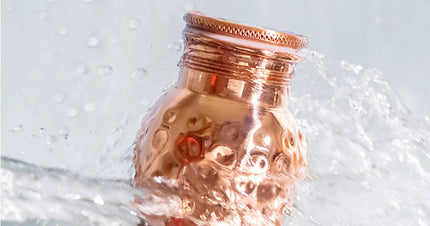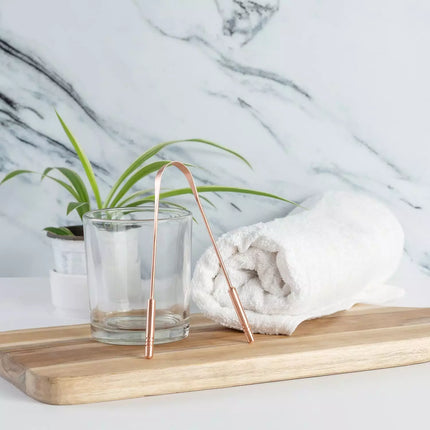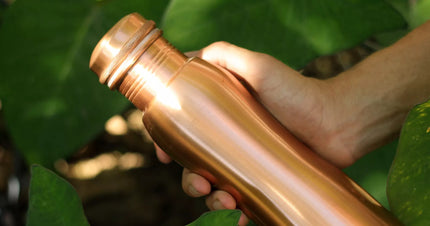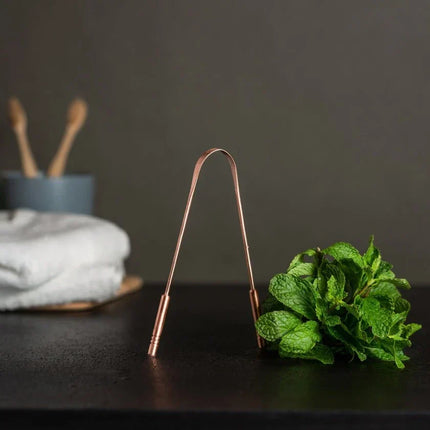Tax included and shipping calculated at checkout
Tongue scraping is an important daily self-care ritual in the centuries-old healing system of Ayurveda. Among the various materials available, the copper tongue cleaner holds a special and respected place because of its exceptional qualities and benefits. In this comprehensive article, we will explore both the significance of tongue cleaning and the advantages of using a copper scraper or cleaner compared to plastic or steel. In addition, you will find a detailed step-by-step guide to help you integrate this traditional Ayurvedic practice into your daily routine with ease.

Pure Copper
Made from high-quality pure copper, durable and long-lasting. A better, sustainable choice.

Ayurvedic Ritual
Ayurveda recommends tongue cleaning as the first step in your morning routine to remove Ama (toxins released by the body).

Antibacterial
Completely clean – pure copper naturally has antibacterial and antimicrobial properties.

Practical & Convenient
A smooth wide edge, comfortable grip, and flexible sides for ease of use.
Zungen Cleaning: Origins and Significance
Tongue cleaning is a practice deeply rooted in history and found across many cultures, including Europe, Africa, India, Arabia, and South America. Archaeological findings show that different civilizations used tools for tongue cleaning. In Indian oral care, the “Datun,” a twig of a fragrant shrub, was used as both a toothbrush and a tongue scraper. While often associated with dental care, some traditions also used the softened or roughened end of the twig for tongue cleaning. This method aimed to remove deposits and bacteria from the tongue surface, contributing to overall oral hygiene.
Oral Care in Ayurveda
The ancient Indian healing system Ayurveda continues to promote tongue cleaning, especially with copper. This practice focuses on the removal of “Ama,” materials associated with a coated tongue. According to Ayurvedic principles, scraping accumulated buildup from the tongue can lead to improved oral health and overall physical balance.
Key Aspects of Tongue Cleaning in Ayurveda
- Oral Hygiene: One of the main benefits is improved oral hygiene. Ayurveda emphasizes removing “Ama” (toxins) from the body, and the tongue is seen as a mirror of the digestive system. Cleaning the tongue helps remove buildup, prevent bad breath, and support overall oral health.
- Enhanced Taste Sensation: Removing deposits from the tongue can improve taste perception, increasing enjoyment of food and promoting mindful eating, important in Ayurveda for a balanced diet.
- Balancing the Doshas: Ayurveda views Vata, Pitta, and Kapha as elemental forces guiding body and mind. Tongue cleaning helps balance these Doshas by removing excess mucus or coating linked to imbalances.
- Improved Breath: By removing buildup, tongue cleaning can significantly reduce bad breath.
- Body–Mind Connection: Ayurveda highlights the interaction of body and mind. Integrating tongue cleaning into your daily routine supports overall wellbeing and mindfulness.
Benefits of Using a Copper Tongue Cleaner
- Natural Antimicrobial Properties: Copper has natural antimicrobial qualities, making it ideal for tongue cleaning. Copper ions effectively inhibit the growth of bacteria, fungi, and other microorganisms. Forrest & Love copper tongue cleaners were lab-tested for antibacterial effectiveness in the mouth, promoting oral hygiene and reducing the risk of bad breath and coating.
- Ayurvedic Benefits: Copper is valued in Ayurveda for balancing the three Doshas – Vata, Pitta, and Kapha. Using a copper tongue cleaner not only supports cleaning but also encourages overall wellbeing and inner harmony.
- Efficient Cleaning: The unique design of Forrest & Love’s tongue cleaner ensures thorough cleaning of the entire tongue surface. The rounded edge effectively removes buildup without discomfort, while its flexibility adapts to the contours of the tongue for gentle yet deep cleaning.
- Durability & Eco-Friendliness: Copper tongue cleaners are known for their durability and resilience. Unlike plastic scrapers that degrade over time, copper ones can last a lifetime. Copper’s recyclability also supports sustainability, making it a great choice for eco-conscious individuals.
By integrating copper into your tongue cleaning routine, you embrace a tradition deeply rooted in history while taking a practical approach to oral health, holistic wellbeing, and environmental awareness.
Step-by-Step Guide to Using a Copper Tongue Scraper
- Preparation: Clean your copper scraper before first use with mild soap and warm water. Avoid harsh cleaners as copper reacts to acids. Rinse with water before each use.
- Timing: The best time is in the morning, immediately after waking up and before eating or drinking. Overnight, deposits form on the tongue, making this step crucial. Perform before brushing your teeth.
- Holding the Scraper: Grip it firmly with thumb and forefinger. A secure hold ensures precise cleaning.
- Stick Out the Tongue: Open your mouth and gently extend your tongue, reaching as far back as comfortable.
- Scraping Motion: Place the rounded edge at the back of the tongue and gently pull forward with light pressure. This removes toxins and buildup effectively. The flexible sides help adjust to what feels best for you.
- Repeat: Scrape four to five times, covering the entire tongue surface. Avoid pressing too hard.
- Rinse: Rinse the scraper under running water after each stroke to wash away deposits.
- Clean the Scraper: After finishing, wash it with mild soap and water if needed. Dry completely before storing in a clean, dry place.
- Hydration: Drink a glass of water afterward to refresh and flush away any remaining residue.
In today’s world, where modern health trends often merge with ancient wisdom, Ayurvedic tongue scraping stands as a timeless practice that aligns with holistic wellbeing. This art, deeply rooted in Ayurveda, bridges tradition and modern self-care. Adopting a copper tongue scraper is not just a routine task – it’s an act of self-love and care that has stood the test of time.













